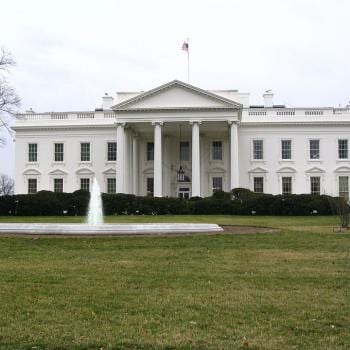One of the National Review’s advocates of codpiece diplomacy, Peter Wehner, takes issue with the Supreme Court decision in Boumediene v. Bush, determining that non-citizens locked up in Guantanamo Bay have the right to challenge their detention. As the majority noted: “Some of these petitioners have been in custody for six years with no definitive judicial determination as to the legality of their detention.'” I’ve already discussed this case, and the dissent by four Catholic justices, here. I’ve argued that it is a moral issue.
Wehner takes an interesting angle, in that he makes reference to the Supreme Court and abortion:
“What moral universe do Justices Kennedy, Breyer, Ginsburg, Stephens, and Souter inhabit when they are willing to manufacture constitutional rights for unlawful enemy combatants who want to slit the throats and watch innocent Americans bleed and die while at the same time uphold manufactured constitutional rights that allow people to abort innocent unborn children?”
He favorably quotes Scalia’s screed about how this will lead to more Americans being killed, with its consequentialist implications. In fact, Wehner is right to connect these moral issues, but totally wrong in the conclusion he draws. For yes, the disconnect be observes is a real one, but so is his own disconnect, his willingness to defend the unborn while in the same breath lock up largely-innocent people in a remote military prison while denying them the most basic rights, and even subjecting them to torture. This too is a reflection of moral values, of the dignity of the human person. And make no mistake, the minority in Boumediene decided unjustly. If you are still in doubt about that, peruse this McClatchy article and the type of men being held in these prisons– they are most certainly terrorist masterminds, and most were simply “low level Taliban grunts, innocent Afghan villagers or ordinary criminals.”
The error is always a form of consequentialist reasoning (not surprising in an Enlightenment-influenced culture, since the dominant strain of utilitarianism is a mere special case of consequentialism). For one side, it is better that the “enemy” suffers rather than risk the safety of the American people. Security by all means necessary. For the other, the welfare of the woman is contingent on her having the right to terminate her unborn child. It’s the same logic. And yet people like Wehner refuse to join the dots and make the connection.
I can predict the response to this post. The “right” to abortion was not in the constitution, pulled out of thin air, while the dissenters in the present case are applying proper legal and constitutional precedent. Hogwash. Scalia is arguing from political preferences, in exactly the same manner as the authors of Roe v. Wade. They all took some notion of welfare that they deemed important in society (“security”, “freedom of choice”) and crafted a legal argument around it. It matters not whether it is a positive or negative right within a written constitution.
The charade that this is a group of technocratic judges following the letter of the law should be ended. Everybody knows that in political cases, the judgments follow political preferences (the most notorious being Bush v. Gore). To pretend otherwise has the effect of insulating judges from the implications of their decisions– lacking accountability in a way that is not possible for the executive or the legislative branches. It is for this reason we don’t hear about Catholics trying to deny communion to Justice Kennedy for supporting abortion or Justice Scalia for supporting torture. But the moral law applies to them too.
Remember this:
“Then he will say to those on his left, ‘Depart from me, you accursed, into the eternal fire prepared for the devil and his angels. For I was hungry and you gave me no food, I was thirsty and you gave me no drink, a stranger and you gave me no welcome, naked and you gave me no clothing, ill and in prison, and you did not care for me.’ Then they will answer and say, ‘Lord, when did we see you hungry or thirsty or a stranger or naked or ill or in prison, and not minister to your needs?’ He will answer them, ‘Amen, I say to you, what you did not do for one of these least ones, you did not do for me.’ And these will go off to eternal punishment, but the righteous to eternal life.”
The stakes are high.











